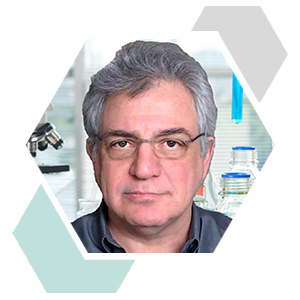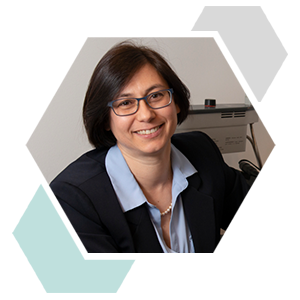Active Rett Research Funded by IRSF
More than $58 million invested in research to date
Rett syndrome is a complex disorder that requires multiple approaches. That’s why IRSF invests in innovative research both for new drugs to treat Rett syndrome AND genetic treatments for curative approaches, while also working to build a robust treatment pipeline and ensure clinical trial readiness and success.
Our strategy is simple, but powerful: improve care today and create treatments for tomorrow. We are committed to a full-spectrum approach to provide solutions for everyone living with Rett syndrome.
Scroll down to learn more about the more than 30 active research projects from around the globe funded thanks to IRSF donors and supporters. For questions or more information on our funded research, please email us.
Jump to Research Type:
Gene Therapies | Drug Development | Clinical Trial Readiness | Other Research
Previously Funded | Funding Opportunities
Research INVESTIGATING GENETIC TREATMENTS AS CURATIVE APPROACHES

Ospedale San Raffaele S.R.L. (San Raffaele Hospital)
Modulating MeCP2 expression heterogeneity in brain cells for increasing gene therapy efficacy and safety in Rett syndrome
Current gene therapy vectors are not able to differentiate MECP2 expression between different cells. This project is designed to advance the efficacy and safety of gene therapy for moving rapidly to its exploitation in the clinical arena. A new AAV capsid and gene therapy vector with novel elements able to reduce MECP2 gene levels exclusively in glial cells will be validated.
Innovation Award, 2022

Vanderbilt University
RNA Editing-Mediated Modification of a Common Nonsense Mutation in Rett Syndrome
Dr. Emeson’s lab has developed a novel RNA-editing strategy to engineer short RNAs that may help efficiently repair specific mutations in the RNA transcripts encoding MECP2. Now, they will begin further study of this repair mechanism, beginning with a test tube-based system, and later followed by the use of human cell lines which have been modified to carry the MECP2 mutations.
Innovation Award, 2022

Josep Carreras Leukaemia Research Institute
Leveraging the RNA binding activity of MECP2 to improve gene replacement therapy for Rett syndrome
Dr. Guil’s lab will design a new gene therapy strategy that improves several features of the current approaches. They will explore moderating MeCP2 levels to avoid toxicity due to excessive expression of the gene (which can be as bad as its deficiency) and discriminating between cells that express the normal gene and cells that express the mutant gene.
Innovation Award, 2022

University of California, Davis
A CRISPR toolbox for curative strategies for Rett syndrome
This project employs a CRISPR-based strategy for restoring MeCP2 through X-chromosome reactivation. An improved CRISPR cassette will be designed that is dramatically reduced in size, thereby allowing it to fit well inside AAV shell for delivery into cells.
Mentor: Kyle Fink, PhD – University of California, Davis
Independence Award, 2022

Massachusetts General Hospital
Preclinical development of Rett syndrome ASO drugs
This study focuses on restoring MECP2 in patients by reactivating its dormant, normal copy carried on the inactive X chromosome via an ASO-based strategy. This will be achieved by performing proof-of-concept studies in a mouse model and optimizing preclinical candidates in patient cells.
Innovation Award, 2022
Previous Award Recipients Actively Studying Gene Therapies
 Evaluation of AAV9-BDNF treatment in two mouse models of RTT
Evaluation of AAV9-BDNF treatment in two mouse models of RTT
Increased Bdnf expression can rescue certain deficits associated with MeCP2 deficiency in mice, which raises the possibility of using Bdnf as a therapeutic tool for Rett syndrome. This project will test this idea by evaluating the effect of AAV9-Bdnf treatment in two mouse models of RTT.
Basic Research Award, 2019
 Functional Analysis of an Enhancer-like Element Required for Xist Expression
Functional Analysis of an Enhancer-like Element Required for Xist Expression
Reactivating the silent X-chromosome may provide females with Rett syndrome the normal MeCP2 protein their cells need for proper functioning. This research explores a novel method of X-chromosome reactivation identified by Dr. Snyder’s lab.
Basic Research Award, 2020
 In-silico optimized guideRNAs to revert monogenetic diseases by site-directed RNA editing
In-silico optimized guideRNAs to revert monogenetic diseases by site-directed RNA editing
Dr. Stafforst’s lab has developed a new way of performing gene-modifying therapy that utilizes RNA editing, a process that modifies the specific RNA intermediate made from a gene before it is used to make a functional protein product. This research will determine if the lab’s RNA editing technology can treat Rett syndrome.
Basic Research Award, 2020
Research Paving the Path to New Drugs to Treat Rett Syndrome

Baylor College of Medicine
Modulation of the GDF11-SMAD3 signaling pathway to treat Rett syndrome
Dr. Bajikar has found that MeCP2 could be regulating 2 key genes – GDF11 and Smad3. The imbalance MeCP2 causes within these genes may contribute to the development of Rett syndrome. With this project, he will dig deeper into restoring the proper function of these genes in mouse models and tests drugs that can restore this balance.
Mentor: Huda Zoghbi, MD – Baylor College of Medicine
Independence Award, 2022

University of Wisconsin-Madison
Integrated multi-level characterization of Rett syndrome disease states
Different labs study the errors that occur in Rett neurons one at a time – this makes it hard to combine the results and paint the big picture. This project studies three key changes in Rett neurons in the same neuron – permitting a holistic characterization of the disease process and providing clues about how the process can be reversed.
Co-PIs: Andre Sousa, PhD, Daifeng Wang, PhD, and Xinyu Zhao, PhD – University of Wisconsin-Madison
Innovation Award, 2022

University of North Carolina at Chapel Hill
Pilot study to establish abnormal motor network dynamics during reaching and grasping movements in a mouse model of Rett Syndrome
The loss of purposeful hand movements is a central feature of Rett Syndrome. This project combines large-scale neural recordings with high-resolution tracking of hand movements in animal models to advance understanding of the brain mechanisms that cause these same movements in Rett Syndrome. This may also provide valuable information about related speech or cognitive symptoms.
Innovation Award, 2022

The Rockefeller University
Single-Molecule Investigation of Nucleosomes as Recruiting Hotspots for MeCP2
DNA-binding is one of the fundamental roles of MeCP2 – but not all the pieces are understood. This project employs an innovative ultra-high-resolution microscopy approach, tracking one molecule of MeCP2 at a time on DNA, that could help uncover new avenues for therapeutic intervention for Rett syndrome.
Innovation Award, 2022

Whitehead Institute for Biomedical Research
The role of transcriptional condensates in Rett Syndrome
Some parts of the MeCP2 protein are flexible, and these portions help it gather together with its partners – like DNA, RNA, and other proteins – to form island-like areas within the cell’s nucleus. This project studies how RTT mutations interfere with this, and screens for drugs that can decrease or fix this defect.
Mentor: Rudolf Jaenisch, MD – Whitehead Institute for Biomedical Research
Independence Award, 2022

University of Colorado Boulder
Advancing an understanding of MECP2 function by identification of methylated RNA targets
MeCP2 is mainly known for its association with DNA, but researchers have started to find that it works with another key molecule – RNA. This project digs deeper into how MeCP2 works with RNA and may uncover new potential therapies for Rett syndrome.
Innovation Award, 2022

University of Texas Southwestern Medical Center
Exploring the formation and function of novel MECP2 genomic binding sites
This is a potentially paradigm-shifting study on where and how MeCP2 binds to DNA. This new exploration into the roles of previously uncharacterized mechanisms will provide more options for therapeutic strategies to treat individuals with Rett syndrome.
Innovation Award, 2022
Previous Award Recipients Actively Studying New Drugs and Therapeutics
 A new view on Rett syndrome and its treatment through whole-brain functional connectomics in model mice
A new view on Rett syndrome and its treatment through whole-brain functional connectomics in model mice
This project aims to visualize whole-brain communication networks at single neuron scale to study abnormalities in Rett syndrome model mice, males and females, at different points in the disease progression.
Innovation Award, 2021
 Investigating the role of microglia in Rett syndrome using multiple human cellular models
Investigating the role of microglia in Rett syndrome using multiple human cellular models
Microglia, a type of immune cell present in the brain, are affected by Rett syndrome and may provide a novel treatment target in mouse models. This research project will determine whether human microglia do the same.
Basic Research Award, 2020
 Targeting choroid plexus Otx2 as novel therapy in RTT
Targeting choroid plexus Otx2 as novel therapy in RTT
The choroid plexus is easily accessible from the circulatory system and has been exploited as an easy target for gene therapy of pediatric neurological diseases. This project explores if the choroid plexus can be a therapeutic target to treat RTT, paving the way to clinical trials.
Co-PI: Takao Hensch, PhD – Harvard Medical School
Innovation Award, 2021
Two-photon imaging of excitatory/inhibitory cortical activity in mosaic Mecp2 female animal model
This project will determine how the activity of neuronal circuits is impacted by the expression or absence of MeCP2 during regression and recovery in the visual system of Mecp2 mutant mice. The study will allow us to visualize for the first time how neuronal cortical activity changes with the progression of RTT, and, more importantly, provide a better understanding of how and to what degrees these abnormalities can be reversed.
Basic Research Award, 2017
 Pathophysiological structure, interactomics, and function of the N-terminus of MeCP2-E1 and its disease-related mutants
Pathophysiological structure, interactomics, and function of the N-terminus of MeCP2-E1 and its disease-related mutants
Rett syndrome is caused by mutations in the MeCP2 protein, some of which are present in a part of the protein called the N-terminus. This research will determine if and how these mutations alter MeCP2 protein shape and how it interacts with other proteins.
Basic Research Award, 2020
 Exploring the contribution of transposable elements for the pathogenesis of Rett syndrome
Exploring the contribution of transposable elements for the pathogenesis of Rett syndrome
A large portion of our genome is made of repetitive elements that can self-propagate. In the human brain, their activity is believed to be important for neuronal plasticity; however, in Rett syndrome, some of these elements were shown to be over-active in neuronal cells. This project tests if this over-activity contributes to the disease process by employing a combination of cellular models, advanced genome engineering technologies, and bioinformatics.
Innovation Award, 2021
 The interplay of the heat shock cascade and Rett syndrome
The interplay of the heat shock cascade and Rett syndrome
Heat Shock (HS) proteins are a critical mechanism by which all cells respond to stress, and increased HS-signaling is seen in RTT. This project will determine whether increases in HS signaling is driving symptom presentation or serving as a compensatory response to slow disease progression. Targeting HS-signaling would be predicted to impact many of the diverse cell types known to be affected by MeCP2 deficiency.
Co-PI: Colleen Niswender, PhD – Vanderbilt University
Innovation Award, 2021
 Cellular and molecular drug screening system for Rett syndrome therapy
Cellular and molecular drug screening system for Rett syndrome therapy
The first step toward Rett syndrome clinical trials (testing a new drug in animal models) is time-consuming and expensive. The goal of this research is to develop a means of doing this testing in cells in culture instead to reduce the time and cost of this step.
HeART-Translational Research Award, 2020
 Determine the role of loss of MECP2 in human Rett Brain
Determine the role of loss of MECP2 in human Rett Brain
This project is aimed at examining Rett brain samples to learn which types of neurons are most susceptible to the disease and whether the disease is caused by differences in the proportion of various neuronal subtypes. This study will not only point to novel therapeutic targets, but will also help determine which laboratory models most accurately approximate authentic Rett Syndrome.
Innovation Award, 2021
 Characterization of the gut microbiome and metabolome in Rett syndrome
Characterization of the gut microbiome and metabolome in Rett syndrome
Gastrointestinal symptoms frequently complicate the clinical course of RTT patients. This project explores if alterations in the gut bacterial composition and metabolic end-products may underlie intestinal dysfunction in these individuals and contribute to variations in the RTT phenotype.
HeART-Translational Research Award, 2015
 Identification of biomarkers of IGF1’s related drugs in Rett syndrome
Identification of biomarkers of IGF1’s related drugs in Rett syndrome
This project analyzes blood samples from Rett syndrome patients treated with trofinetide in phase 2 clinical trials and their relative clinical information to identify the molecular markers present in responders to the drug.
Translational Research Award, 2017
 Dissecting the role of MeCP2 loss-of-function on redox and immune homeostasis. Could the endoplasmic reticulum-mitochondria axis be involved in Rett syndrome?
Dissecting the role of MeCP2 loss-of-function on redox and immune homeostasis. Could the endoplasmic reticulum-mitochondria axis be involved in Rett syndrome?
Mitochondria are the powerhouses for cells and provide energy to carry out most cellular processes. Their function, however, is altered in RTT. This project digs deeper into one aspect of this dysfunction by studying Mitochondria-associated ER membranes (MAMs). In the process, it may help to better understand some characteristic RTT symptoms.
Innovation Award, 2021
(previous PI: Alessandra Pecorelli, PhD, PharmD)
 NLRP3 inflammasome inhibitors as new therapeutic approach for Rett syndrome
NLRP3 inflammasome inhibitors as new therapeutic approach for Rett syndrome
NLRP3 inflammasome is an important machinery involved in immune responses. This project explores if its activation is a possible trigger to switch from pre-symptomatic conditions to symptomatic status. In addition, the project will also investigate if the use of inflammasome inhibitors, both chemical and natural compounds, can result in improvement.
Innovation Award, 2021
Research ensuring clinical trial readiness and success

University of Colorado Denver
The diagnostic experience of male Rett Syndrome
Males with mutations in MECP2 have been understudied with more than 10x as many publications dedicated to females. Data from the NIH- sponsored Natural History Study suggests there is a very broad spectrum of disease symptoms and severity, some of which are different from females. This study will result in a better understanding of the diagnostic odyssey and lived experiences of parents/guardians of males with RTT in order to inform needed future clinical trials.
Co-PIs:
Dr. Talia Thompson – University of Colorado Denver
Drs. Cary Fu and Jeffrey Neul – Vanderbilt University
Drs. Amitha Ananth and Alan Percy – University of Alabama
Center of Excellence Research Award, 2022
Previous Award Recipients Actively Ensuring Clinical Trial Success
 Validation of GHQ
Validation of GHQ
Individuals with RTT syndrome develop gastrointestinal (GI) problems that affect their health. The clinical assessment of GI issues is one area where health and quality of life are overlooked and represent an unmet need. Dr. Motil developed the Gastrointestinal Health Questionnaire (GHQ) to be completed by caregivers to assess GI problems in RTT. This study will validate the GHQ across 6 COE locations and determine if the questionnaire can accurately measure changes in response to GI treatments.
CoE Research Award, 2021
 Development of treatment responsive biomarker in RTT
Development of treatment responsive biomarker in RTT
Biomarkers are things that can be measured in a person and might relate to how affected a person is. Unfortunately, there are currently no good biomarkers of improvement in RTT which could help with the development of new treatments and clinical trials. This group has found changes in brain waves in patients and in mouse models that they think could be such biomarkers. In this project, they will test if chemicals that have shown functional improvement in mice also improve brain waves. If successful, these brain wave measurements could be used to shorten the length of clinical trial process, getting drugs and other treatments to patients faster.
Co-PI: Hong-Wei Dong, MD, PhD – Vanderbilt University
Innovation Award, 2021
 Gait analysis in Rett
Gait analysis in Rett
Gait is abnormal in RTT and linked to the overall severity of the syndrome. As mobility is an objective way to measure improvement, in the setting of treatments on the horizon that seek to broadly improve RTT, this study aims to build on prior data to develop quantitative outcome markers of gait that can be used and compared across multiple sites. The goal is to have an objective measure that could be used in future clinical trials for RTT.
CoE Research Award, 2021
additional critical research funded by irsf
 An intensive anti scoliosis postural intervention, supported by an application for individuals with Rett syndrome
An intensive anti scoliosis postural intervention, supported by an application for individuals with Rett syndrome
Dr. Lotan has successfully halted or reversed scoliosis in a few patients with Rett syndrome using a physical therapy-based intervention program built alongside patients and their families. This study scientifically tests the effectiveness of such a program and develops a phone app that facilitates its use.
HeART-Neuro-Habilitation Award, 2020